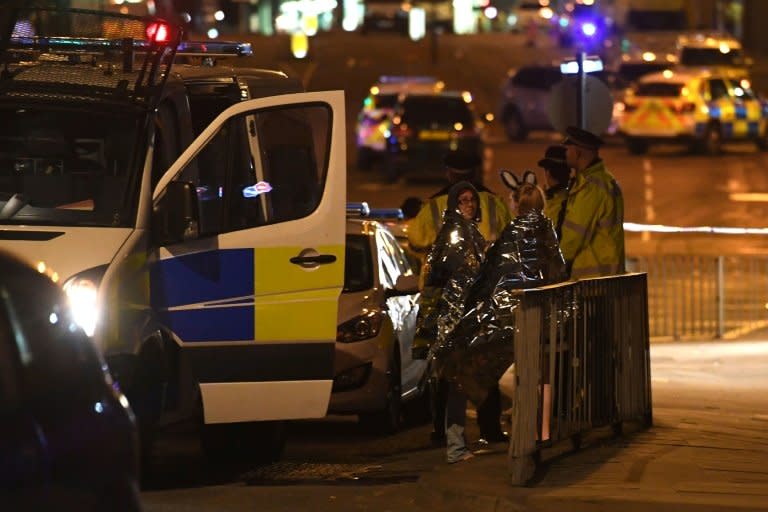After new concert carnage, industry hopes to prevail

© AFP Paul ELLIS
New York (AFP) - Violence has once again struck music fans with a suicide attack on Ariana Grande's Manchester show, but the booming concert industry hopes to withstand the new shock.
The explosion Monday in the British arena, which killed 22 people moments after the US pop idol left the stage, comes a year and a half after another assault claimed by the Islamic State group devastated a rock show at the Bataclan in Paris.
With extremists looking for maximum public impact, the blast at the Manchester Arena was especially grisly as Grande's fan base is full of young girls, with an eight-year-old among the confirmed victims.
The assaults come after a decade of soaring growth across the Western world in live music, which has far surpassed sales of recordings as the key money-maker for artists.
Share prices of Live Nation, the concert giant behind Grande's tour, slumped by nearly one percent Tuesday on security jitters after a year in which their value jumped by nearly half.
Joe Reinartz, news editor at the live music industry publication Pollstar, said he expected more parents to think twice about taking children to concerts or other crowded places.
"Right now the answer it's just too early to tell and nobody has a crystal ball," Reinartz said of the Manchester attack's impact on live music.
But he added: "I would say that there would probably be an immediate impact on all public gatherings of a massive size in the near future."
- Young fuel growth -
Live music is hardly the only target. Recent mass-casualty attacks in the Western world have included trucks slamming into pedestrians on the Nice promenade and a Berlin Christmas market, and a gun attack inside a gay nightclub in Orlando.
James Donio, president of the Music Business Association, a US-based trade group, said it was human nature for parents to want to protect their children but also noted that foolproof security in and around venues was impossible.
"This is the world we have been living in for a few years," he said. "You cannot say that you're going to have a guarantee of nothing happening or being completely safe, which is sad."
"We're about keeping the music playing and encouraging people to enjoy what music brings to the world.
"If that means that has to be balanced with waiting in a longer line to get in, that's part of what we have to do as fans."
Young people, although not necessarily pre-teens, have been at the forefront of live music's expansion with summer festivals becoming a rite of passage for millennials of sufficient means.
Analytical firm IbisWorld estimates that live music is a $28 billion a year industry in the United States alone, with growth averaging five percent annually for the past five years.
- Security already tight -
Security was already stepped up around the world following the Bataclan attack, with major venues setting up control rooms and promoters meticulously sifting through bags -- raising questions on how the Manchester assailant evaded detection.
Daniel Colling, director of the 6,000-capacity Zenith in Paris, said the concert hall has ramped up both security personnel and screening since the November 2015 assault on Paris.
"If new attacks hit concert halls, we will have to worry about a reduction in attendance, especially for shows that reach audiences made up of families, the young and foreigners," he said.
Many concert promoters declined to discuss in depth the impact of the attack, feeling it was insensitive to talk business after so much human suffering.
Michael Dugher, chief executive of the British industry umbrella group UK Music, said that music "has the power to bring people together and is so often a celebration of peace and love."
"We will not let terrorism and the politics of violence, hatred and division conquer that spirit," he said in a statement.
See Also:

 Yahoo News
Yahoo News 

